Organisational Behaviour: Analysing Unilever's Performance and Culture
VerifiedAdded on 2022/11/28
|11
|3077
|80
Report
AI Summary
This report provides an in-depth analysis of organisational behaviour, focusing on Unilever as a case study. It explores how organisational culture, politics, and power dynamics influence individual and team behaviour and performance. The report delves into motivation theories, including Maslow's hierarchy and Vroom's expectancy theory, to explain how goals are effectively achieved within an organisation. It also compares and contrasts the characteristics of effective and ineffective teams, examining factors that contribute to success or failure. Finally, the report discusses the application of organisational behaviour concepts and philosophies within a company context, providing valuable insights into fostering a productive and efficient work environment.
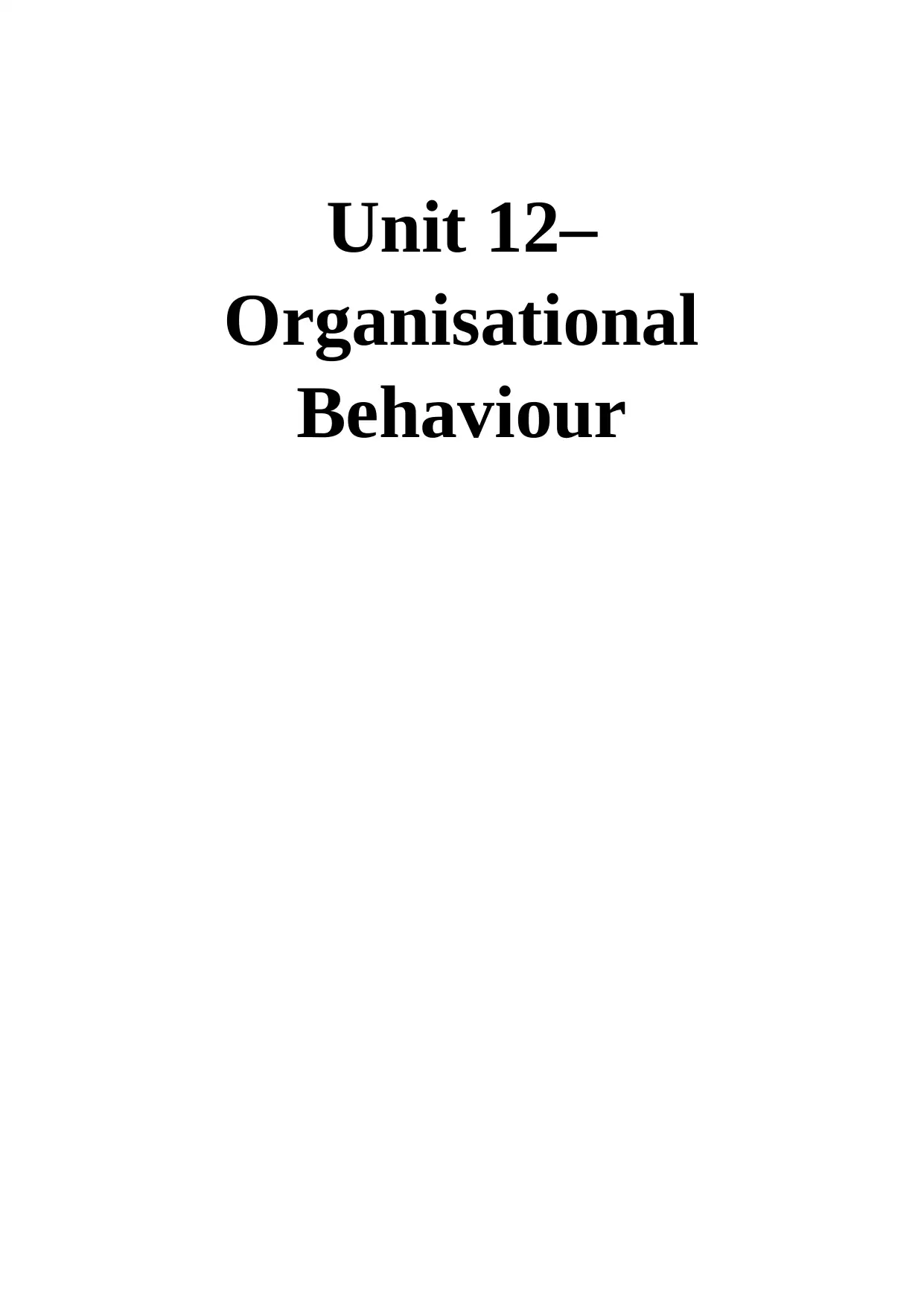
Unit 12–
Organisational
Behaviour
Organisational
Behaviour
Paraphrase This Document
Need a fresh take? Get an instant paraphrase of this document with our AI Paraphraser
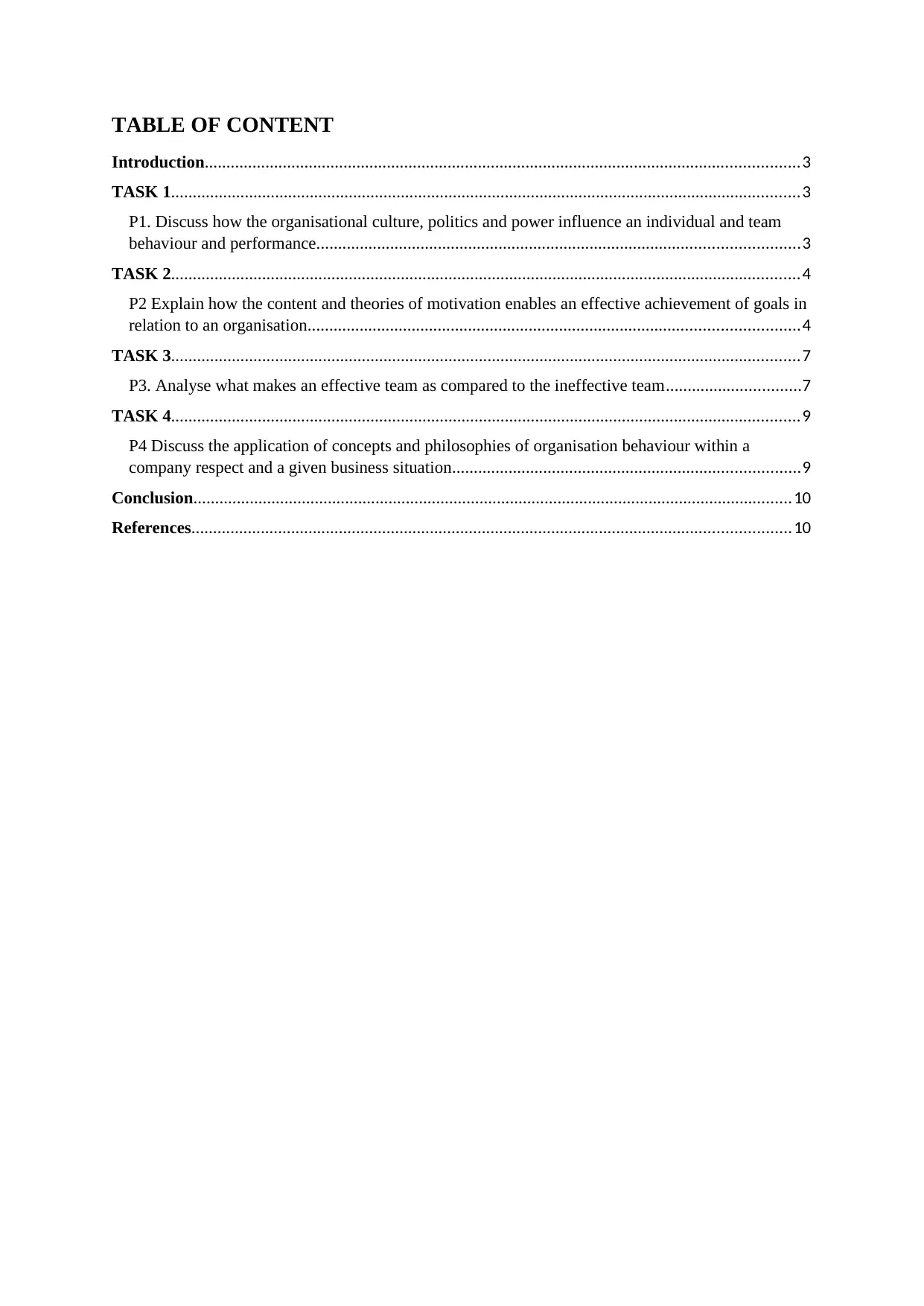
TABLE OF CONTENT
Introduction.........................................................................................................................................3
TASK 1.................................................................................................................................................3
P1. Discuss how the organisational culture, politics and power influence an individual and team
behaviour and performance...............................................................................................................3
TASK 2.................................................................................................................................................4
P2 Explain how the content and theories of motivation enables an effective achievement of goals in
relation to an organisation.................................................................................................................4
TASK 3.................................................................................................................................................7
P3. Analyse what makes an effective team as compared to the ineffective team...............................7
TASK 4.................................................................................................................................................9
P4 Discuss the application of concepts and philosophies of organisation behaviour within a
company respect and a given business situation................................................................................9
Conclusion..........................................................................................................................................10
References..........................................................................................................................................10
Introduction.........................................................................................................................................3
TASK 1.................................................................................................................................................3
P1. Discuss how the organisational culture, politics and power influence an individual and team
behaviour and performance...............................................................................................................3
TASK 2.................................................................................................................................................4
P2 Explain how the content and theories of motivation enables an effective achievement of goals in
relation to an organisation.................................................................................................................4
TASK 3.................................................................................................................................................7
P3. Analyse what makes an effective team as compared to the ineffective team...............................7
TASK 4.................................................................................................................................................9
P4 Discuss the application of concepts and philosophies of organisation behaviour within a
company respect and a given business situation................................................................................9
Conclusion..........................................................................................................................................10
References..........................................................................................................................................10
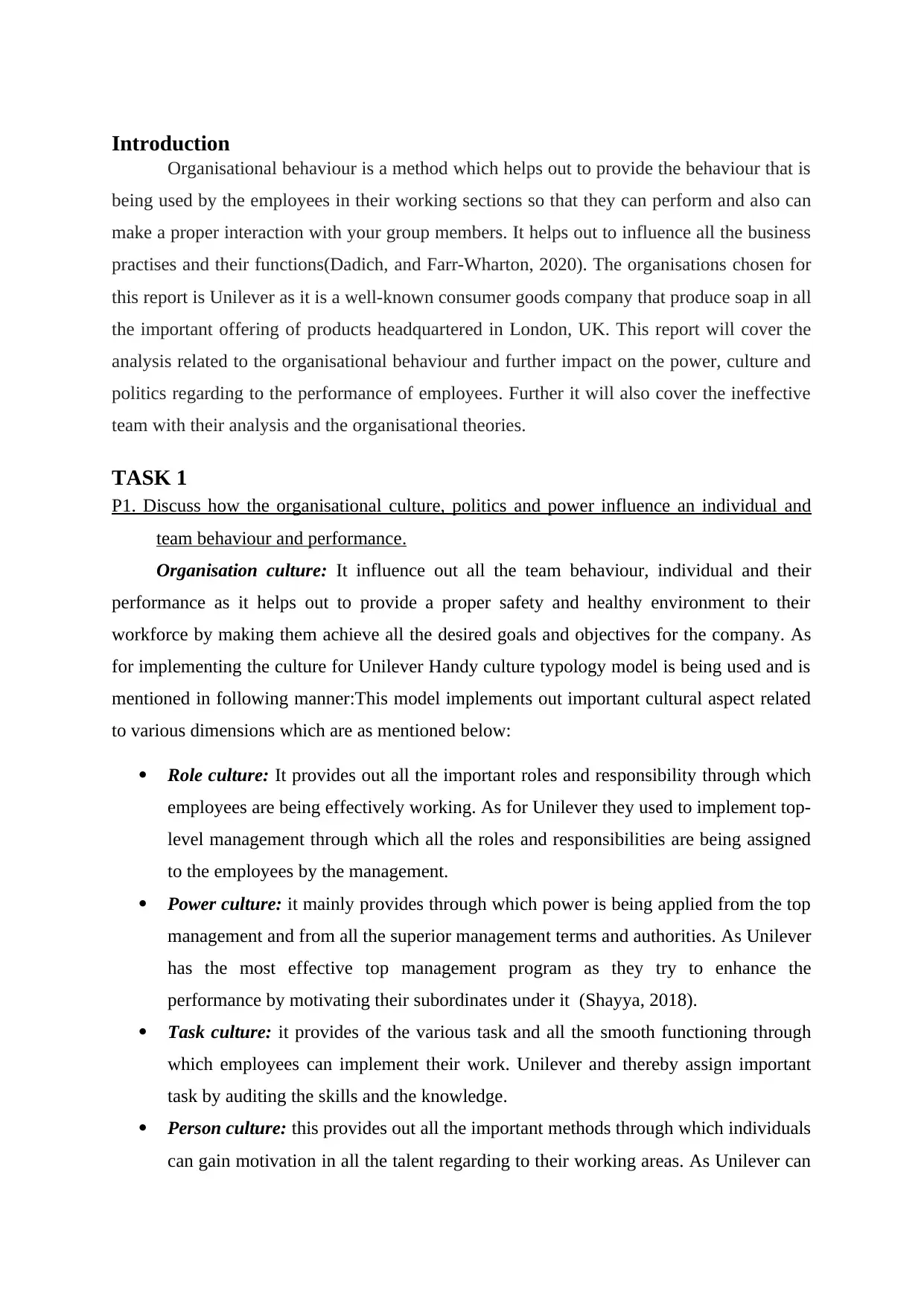
Introduction
Organisational behaviour is a method which helps out to provide the behaviour that is
being used by the employees in their working sections so that they can perform and also can
make a proper interaction with your group members. It helps out to influence all the business
practises and their functions(Dadich, and Farr-Wharton, 2020). The organisations chosen for
this report is Unilever as it is a well-known consumer goods company that produce soap in all
the important offering of products headquartered in London, UK. This report will cover the
analysis related to the organisational behaviour and further impact on the power, culture and
politics regarding to the performance of employees. Further it will also cover the ineffective
team with their analysis and the organisational theories.
TASK 1
P1. Discuss how the organisational culture, politics and power influence an individual and
team behaviour and performance.
Organisation culture: It influence out all the team behaviour, individual and their
performance as it helps out to provide a proper safety and healthy environment to their
workforce by making them achieve all the desired goals and objectives for the company. As
for implementing the culture for Unilever Handy culture typology model is being used and is
mentioned in following manner:This model implements out important cultural aspect related
to various dimensions which are as mentioned below:
Role culture: It provides out all the important roles and responsibility through which
employees are being effectively working. As for Unilever they used to implement top-
level management through which all the roles and responsibilities are being assigned
to the employees by the management.
Power culture: it mainly provides through which power is being applied from the top
management and from all the superior management terms and authorities. As Unilever
has the most effective top management program as they try to enhance the
performance by motivating their subordinates under it (Shayya, 2018).
Task culture: it provides of the various task and all the smooth functioning through
which employees can implement their work. Unilever and thereby assign important
task by auditing the skills and the knowledge.
Person culture: this provides out all the important methods through which individuals
can gain motivation in all the talent regarding to their working areas. As Unilever can
Organisational behaviour is a method which helps out to provide the behaviour that is
being used by the employees in their working sections so that they can perform and also can
make a proper interaction with your group members. It helps out to influence all the business
practises and their functions(Dadich, and Farr-Wharton, 2020). The organisations chosen for
this report is Unilever as it is a well-known consumer goods company that produce soap in all
the important offering of products headquartered in London, UK. This report will cover the
analysis related to the organisational behaviour and further impact on the power, culture and
politics regarding to the performance of employees. Further it will also cover the ineffective
team with their analysis and the organisational theories.
TASK 1
P1. Discuss how the organisational culture, politics and power influence an individual and
team behaviour and performance.
Organisation culture: It influence out all the team behaviour, individual and their
performance as it helps out to provide a proper safety and healthy environment to their
workforce by making them achieve all the desired goals and objectives for the company. As
for implementing the culture for Unilever Handy culture typology model is being used and is
mentioned in following manner:This model implements out important cultural aspect related
to various dimensions which are as mentioned below:
Role culture: It provides out all the important roles and responsibility through which
employees are being effectively working. As for Unilever they used to implement top-
level management through which all the roles and responsibilities are being assigned
to the employees by the management.
Power culture: it mainly provides through which power is being applied from the top
management and from all the superior management terms and authorities. As Unilever
has the most effective top management program as they try to enhance the
performance by motivating their subordinates under it (Shayya, 2018).
Task culture: it provides of the various task and all the smooth functioning through
which employees can implement their work. Unilever and thereby assign important
task by auditing the skills and the knowledge.
Person culture: this provides out all the important methods through which individuals
can gain motivation in all the talent regarding to their working areas. As Unilever can
⊘ This is a preview!⊘
Do you want full access?
Subscribe today to unlock all pages.

Trusted by 1+ million students worldwide
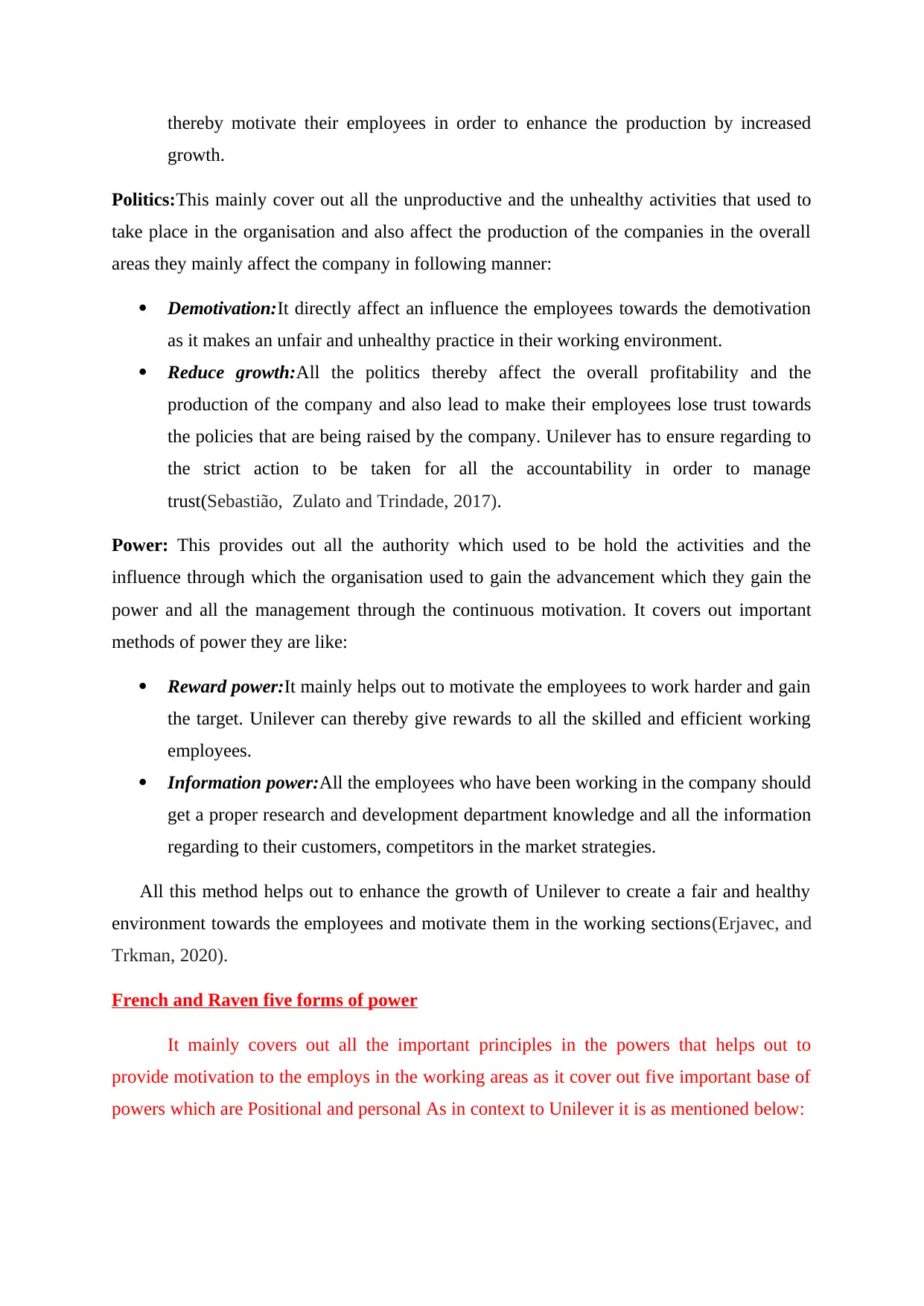
thereby motivate their employees in order to enhance the production by increased
growth.
Politics:This mainly cover out all the unproductive and the unhealthy activities that used to
take place in the organisation and also affect the production of the companies in the overall
areas they mainly affect the company in following manner:
Demotivation:It directly affect an influence the employees towards the demotivation
as it makes an unfair and unhealthy practice in their working environment.
Reduce growth:All the politics thereby affect the overall profitability and the
production of the company and also lead to make their employees lose trust towards
the policies that are being raised by the company. Unilever has to ensure regarding to
the strict action to be taken for all the accountability in order to manage
trust(Sebastião, Zulato and Trindade, 2017).
Power: This provides out all the authority which used to be hold the activities and the
influence through which the organisation used to gain the advancement which they gain the
power and all the management through the continuous motivation. It covers out important
methods of power they are like:
Reward power:It mainly helps out to motivate the employees to work harder and gain
the target. Unilever can thereby give rewards to all the skilled and efficient working
employees.
Information power:All the employees who have been working in the company should
get a proper research and development department knowledge and all the information
regarding to their customers, competitors in the market strategies.
All this method helps out to enhance the growth of Unilever to create a fair and healthy
environment towards the employees and motivate them in the working sections(Erjavec, and
Trkman, 2020).
French and Raven five forms of power
It mainly covers out all the important principles in the powers that helps out to
provide motivation to the employs in the working areas as it cover out five important base of
powers which are Positional and personal As in context to Unilever it is as mentioned below:
growth.
Politics:This mainly cover out all the unproductive and the unhealthy activities that used to
take place in the organisation and also affect the production of the companies in the overall
areas they mainly affect the company in following manner:
Demotivation:It directly affect an influence the employees towards the demotivation
as it makes an unfair and unhealthy practice in their working environment.
Reduce growth:All the politics thereby affect the overall profitability and the
production of the company and also lead to make their employees lose trust towards
the policies that are being raised by the company. Unilever has to ensure regarding to
the strict action to be taken for all the accountability in order to manage
trust(Sebastião, Zulato and Trindade, 2017).
Power: This provides out all the authority which used to be hold the activities and the
influence through which the organisation used to gain the advancement which they gain the
power and all the management through the continuous motivation. It covers out important
methods of power they are like:
Reward power:It mainly helps out to motivate the employees to work harder and gain
the target. Unilever can thereby give rewards to all the skilled and efficient working
employees.
Information power:All the employees who have been working in the company should
get a proper research and development department knowledge and all the information
regarding to their customers, competitors in the market strategies.
All this method helps out to enhance the growth of Unilever to create a fair and healthy
environment towards the employees and motivate them in the working sections(Erjavec, and
Trkman, 2020).
French and Raven five forms of power
It mainly covers out all the important principles in the powers that helps out to
provide motivation to the employs in the working areas as it cover out five important base of
powers which are Positional and personal As in context to Unilever it is as mentioned below:
Paraphrase This Document
Need a fresh take? Get an instant paraphrase of this document with our AI Paraphraser
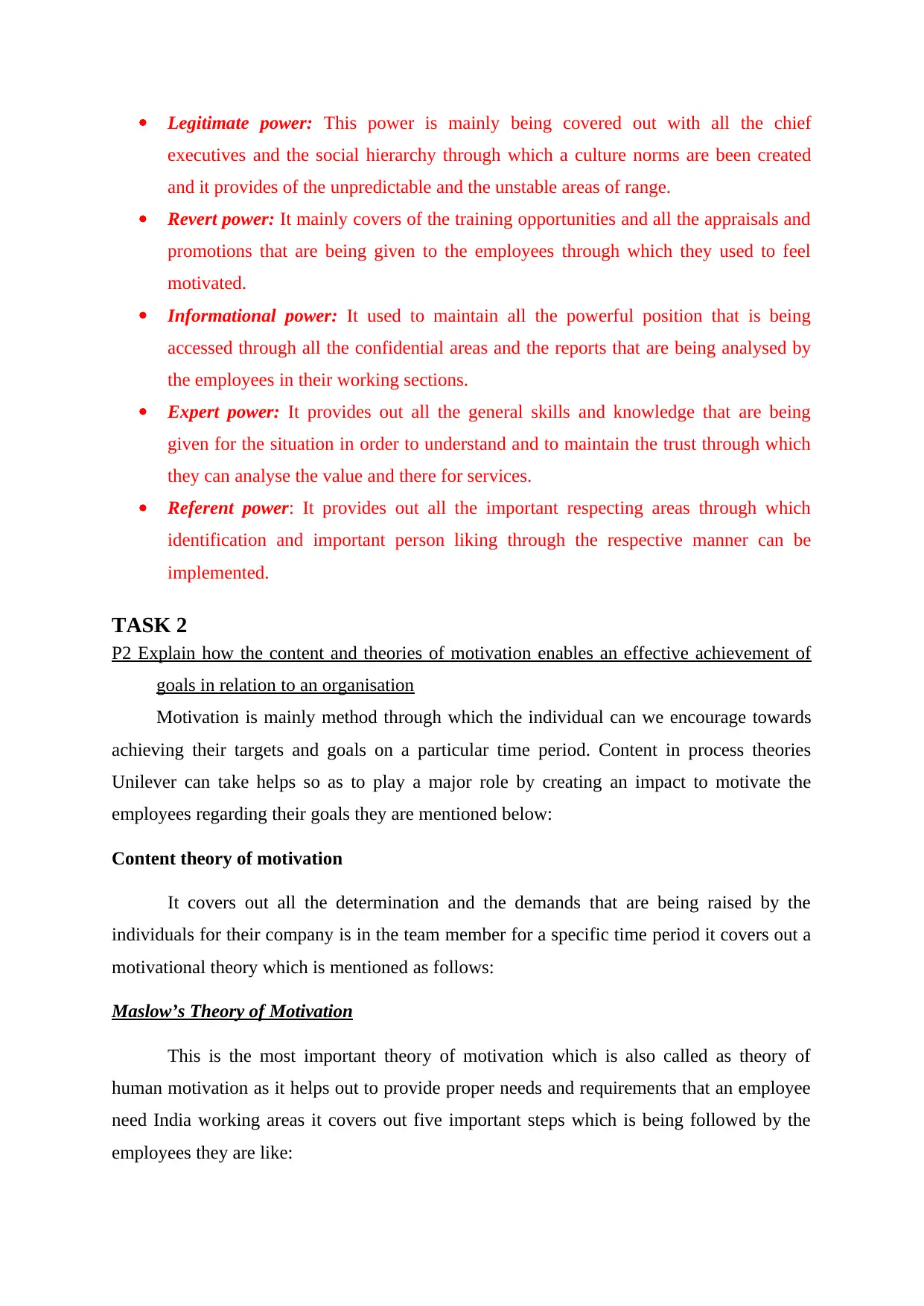
Legitimate power: This power is mainly being covered out with all the chief
executives and the social hierarchy through which a culture norms are been created
and it provides of the unpredictable and the unstable areas of range.
Revert power: It mainly covers of the training opportunities and all the appraisals and
promotions that are being given to the employees through which they used to feel
motivated.
Informational power: It used to maintain all the powerful position that is being
accessed through all the confidential areas and the reports that are being analysed by
the employees in their working sections.
Expert power: It provides out all the general skills and knowledge that are being
given for the situation in order to understand and to maintain the trust through which
they can analyse the value and there for services.
Referent power: It provides out all the important respecting areas through which
identification and important person liking through the respective manner can be
implemented.
TASK 2
P2 Explain how the content and theories of motivation enables an effective achievement of
goals in relation to an organisation
Motivation is mainly method through which the individual can we encourage towards
achieving their targets and goals on a particular time period. Content in process theories
Unilever can take helps so as to play a major role by creating an impact to motivate the
employees regarding their goals they are mentioned below:
Content theory of motivation
It covers out all the determination and the demands that are being raised by the
individuals for their company is in the team member for a specific time period it covers out a
motivational theory which is mentioned as follows:
Maslow’s Theory of Motivation
This is the most important theory of motivation which is also called as theory of
human motivation as it helps out to provide proper needs and requirements that an employee
need India working areas it covers out five important steps which is being followed by the
employees they are like:
executives and the social hierarchy through which a culture norms are been created
and it provides of the unpredictable and the unstable areas of range.
Revert power: It mainly covers of the training opportunities and all the appraisals and
promotions that are being given to the employees through which they used to feel
motivated.
Informational power: It used to maintain all the powerful position that is being
accessed through all the confidential areas and the reports that are being analysed by
the employees in their working sections.
Expert power: It provides out all the general skills and knowledge that are being
given for the situation in order to understand and to maintain the trust through which
they can analyse the value and there for services.
Referent power: It provides out all the important respecting areas through which
identification and important person liking through the respective manner can be
implemented.
TASK 2
P2 Explain how the content and theories of motivation enables an effective achievement of
goals in relation to an organisation
Motivation is mainly method through which the individual can we encourage towards
achieving their targets and goals on a particular time period. Content in process theories
Unilever can take helps so as to play a major role by creating an impact to motivate the
employees regarding their goals they are mentioned below:
Content theory of motivation
It covers out all the determination and the demands that are being raised by the
individuals for their company is in the team member for a specific time period it covers out a
motivational theory which is mentioned as follows:
Maslow’s Theory of Motivation
This is the most important theory of motivation which is also called as theory of
human motivation as it helps out to provide proper needs and requirements that an employee
need India working areas it covers out five important steps which is being followed by the
employees they are like:
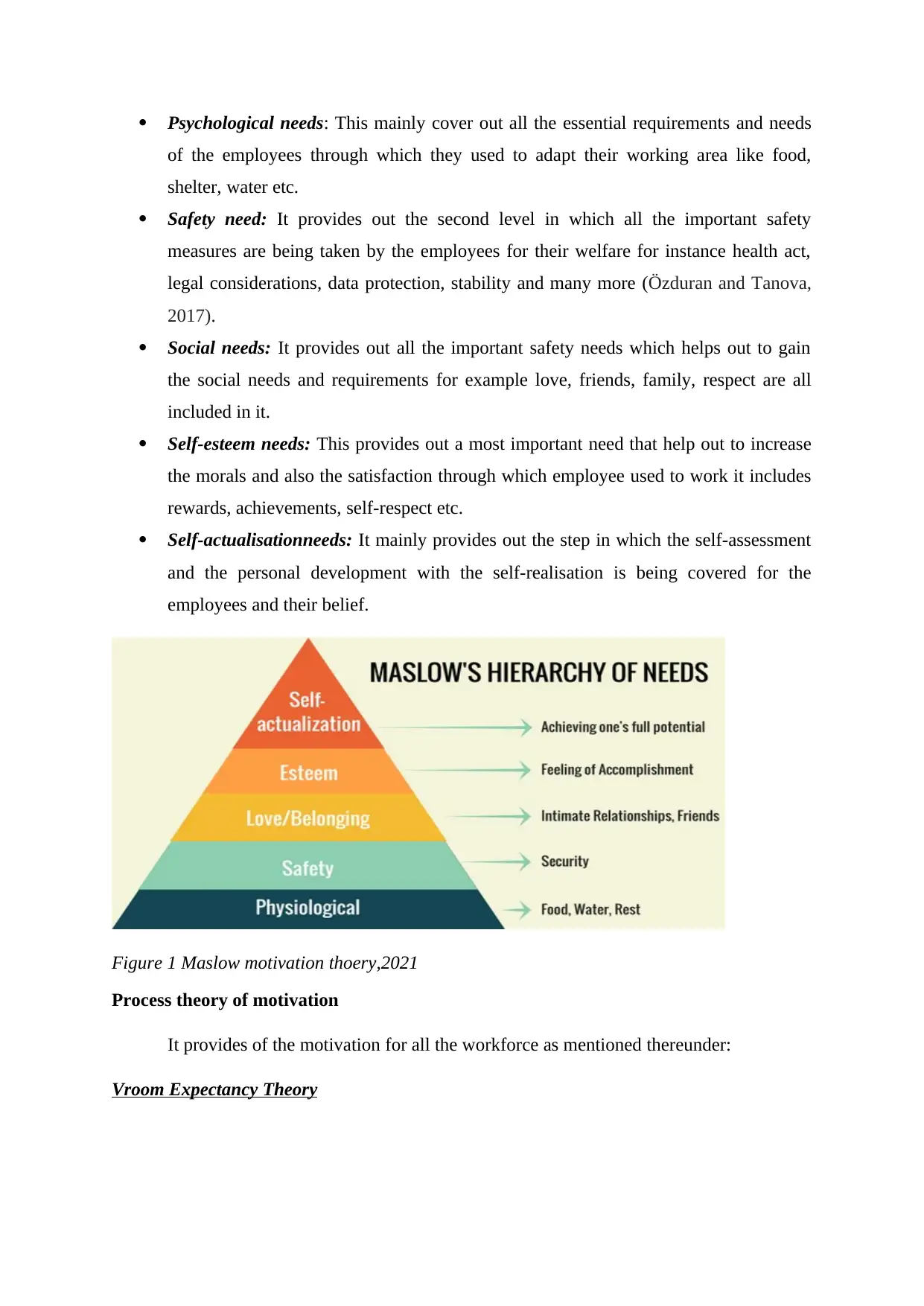
Psychological needs: This mainly cover out all the essential requirements and needs
of the employees through which they used to adapt their working area like food,
shelter, water etc.
Safety need: It provides out the second level in which all the important safety
measures are being taken by the employees for their welfare for instance health act,
legal considerations, data protection, stability and many more (Özduran and Tanova,
2017).
Social needs: It provides out all the important safety needs which helps out to gain
the social needs and requirements for example love, friends, family, respect are all
included in it.
Self-esteem needs: This provides out a most important need that help out to increase
the morals and also the satisfaction through which employee used to work it includes
rewards, achievements, self-respect etc.
Self-actualisationneeds: It mainly provides out the step in which the self-assessment
and the personal development with the self-realisation is being covered for the
employees and their belief.
Figure 1 Maslow motivation thoery,2021
Process theory of motivation
It provides of the motivation for all the workforce as mentioned thereunder:
Vroom Expectancy Theory
of the employees through which they used to adapt their working area like food,
shelter, water etc.
Safety need: It provides out the second level in which all the important safety
measures are being taken by the employees for their welfare for instance health act,
legal considerations, data protection, stability and many more (Özduran and Tanova,
2017).
Social needs: It provides out all the important safety needs which helps out to gain
the social needs and requirements for example love, friends, family, respect are all
included in it.
Self-esteem needs: This provides out a most important need that help out to increase
the morals and also the satisfaction through which employee used to work it includes
rewards, achievements, self-respect etc.
Self-actualisationneeds: It mainly provides out the step in which the self-assessment
and the personal development with the self-realisation is being covered for the
employees and their belief.
Figure 1 Maslow motivation thoery,2021
Process theory of motivation
It provides of the motivation for all the workforce as mentioned thereunder:
Vroom Expectancy Theory
⊘ This is a preview!⊘
Do you want full access?
Subscribe today to unlock all pages.

Trusted by 1+ million students worldwide
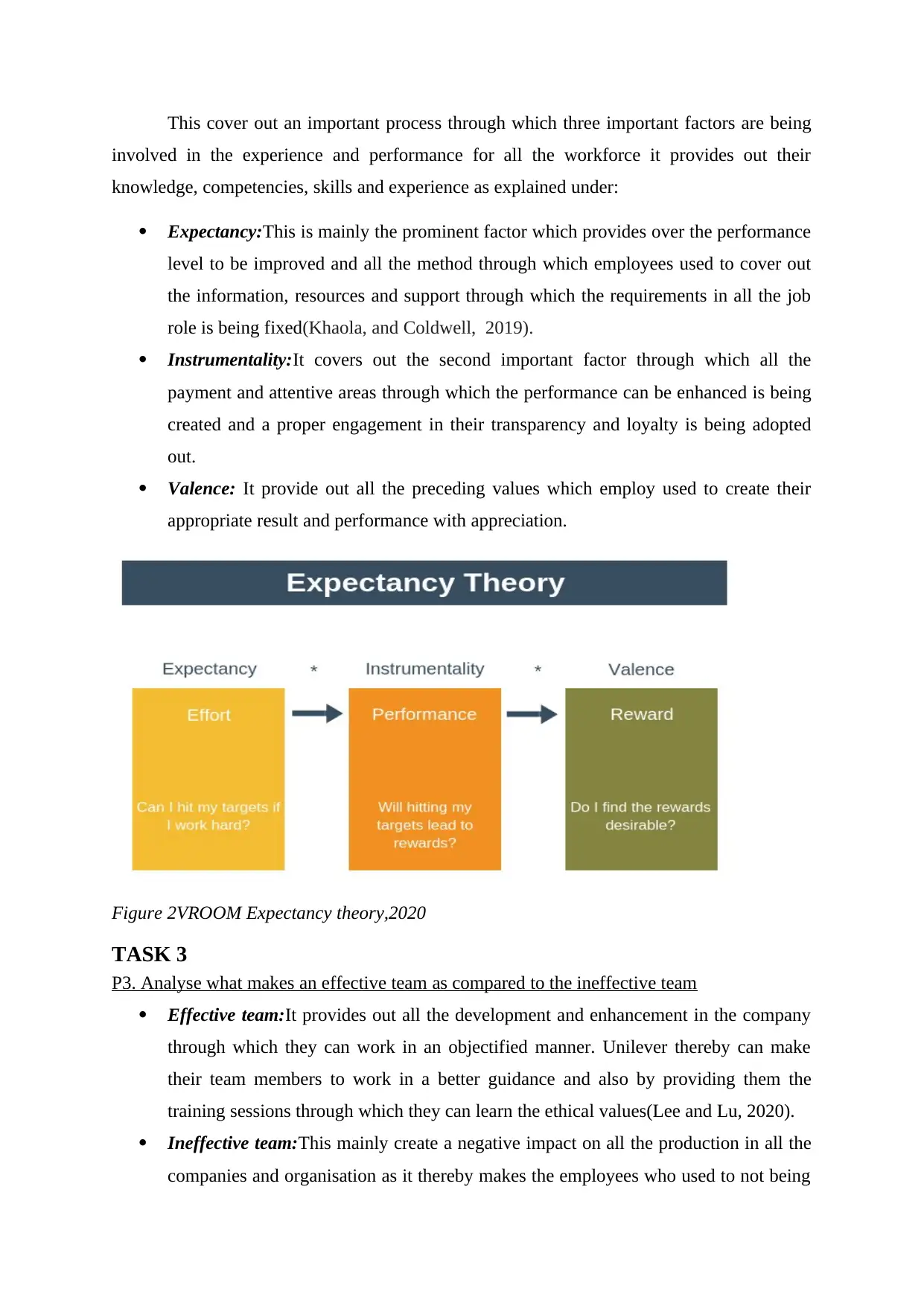
This cover out an important process through which three important factors are being
involved in the experience and performance for all the workforce it provides out their
knowledge, competencies, skills and experience as explained under:
Expectancy:This is mainly the prominent factor which provides over the performance
level to be improved and all the method through which employees used to cover out
the information, resources and support through which the requirements in all the job
role is being fixed(Khaola, and Coldwell, 2019).
Instrumentality:It covers out the second important factor through which all the
payment and attentive areas through which the performance can be enhanced is being
created and a proper engagement in their transparency and loyalty is being adopted
out.
Valence: It provide out all the preceding values which employ used to create their
appropriate result and performance with appreciation.
Figure 2VROOM Expectancy theory,2020
TASK 3
P3. Analyse what makes an effective team as compared to the ineffective team
Effective team:It provides out all the development and enhancement in the company
through which they can work in an objectified manner. Unilever thereby can make
their team members to work in a better guidance and also by providing them the
training sessions through which they can learn the ethical values(Lee and Lu, 2020).
Ineffective team:This mainly create a negative impact on all the production in all the
companies and organisation as it thereby makes the employees who used to not being
involved in the experience and performance for all the workforce it provides out their
knowledge, competencies, skills and experience as explained under:
Expectancy:This is mainly the prominent factor which provides over the performance
level to be improved and all the method through which employees used to cover out
the information, resources and support through which the requirements in all the job
role is being fixed(Khaola, and Coldwell, 2019).
Instrumentality:It covers out the second important factor through which all the
payment and attentive areas through which the performance can be enhanced is being
created and a proper engagement in their transparency and loyalty is being adopted
out.
Valence: It provide out all the preceding values which employ used to create their
appropriate result and performance with appreciation.
Figure 2VROOM Expectancy theory,2020
TASK 3
P3. Analyse what makes an effective team as compared to the ineffective team
Effective team:It provides out all the development and enhancement in the company
through which they can work in an objectified manner. Unilever thereby can make
their team members to work in a better guidance and also by providing them the
training sessions through which they can learn the ethical values(Lee and Lu, 2020).
Ineffective team:This mainly create a negative impact on all the production in all the
companies and organisation as it thereby makes the employees who used to not being
Paraphrase This Document
Need a fresh take? Get an instant paraphrase of this document with our AI Paraphraser
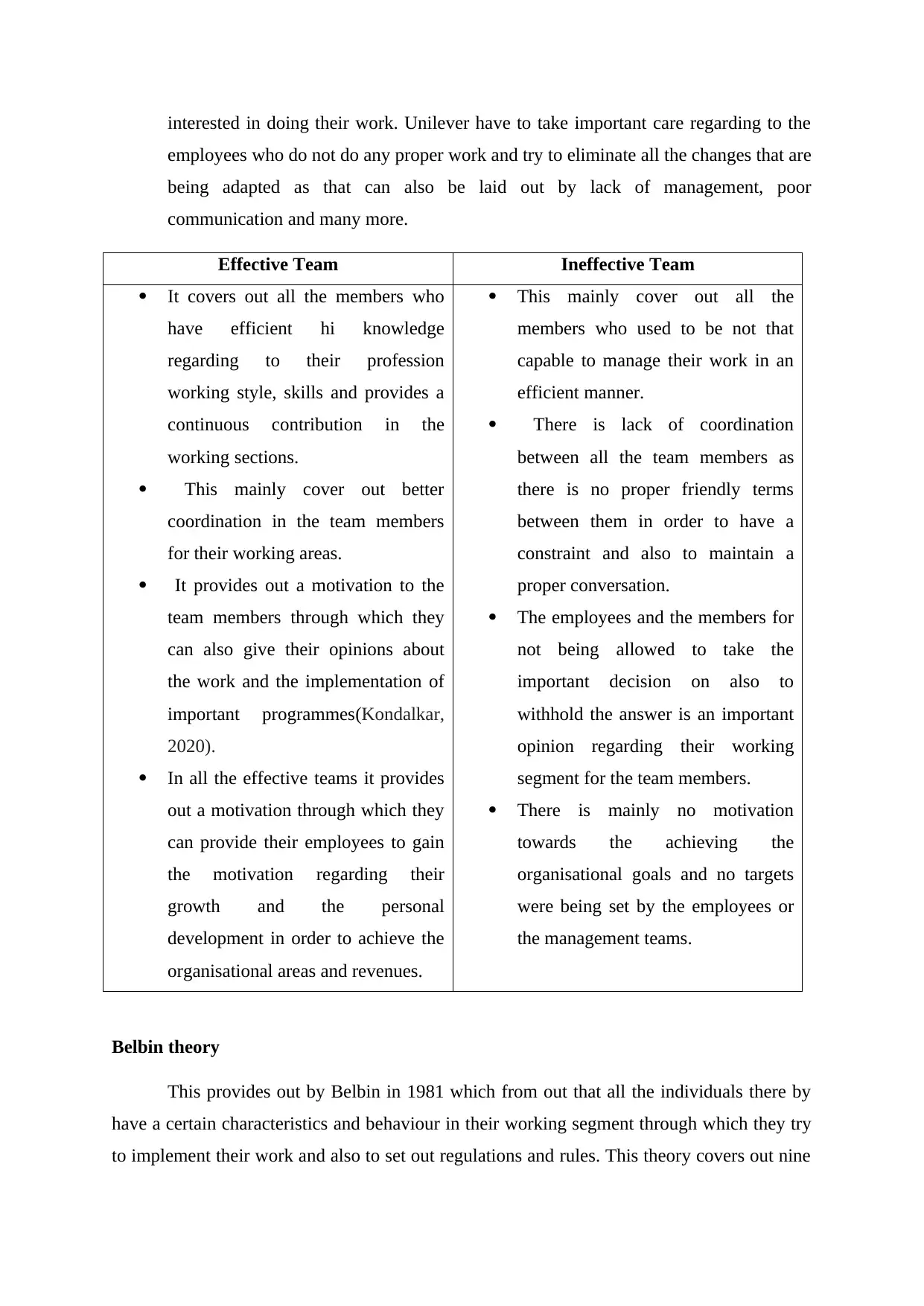
interested in doing their work. Unilever have to take important care regarding to the
employees who do not do any proper work and try to eliminate all the changes that are
being adapted as that can also be laid out by lack of management, poor
communication and many more.
Effective Team Ineffective Team
It covers out all the members who
have efficient hi knowledge
regarding to their profession
working style, skills and provides a
continuous contribution in the
working sections.
This mainly cover out better
coordination in the team members
for their working areas.
It provides out a motivation to the
team members through which they
can also give their opinions about
the work and the implementation of
important programmes(Kondalkar,
2020).
In all the effective teams it provides
out a motivation through which they
can provide their employees to gain
the motivation regarding their
growth and the personal
development in order to achieve the
organisational areas and revenues.
This mainly cover out all the
members who used to be not that
capable to manage their work in an
efficient manner.
There is lack of coordination
between all the team members as
there is no proper friendly terms
between them in order to have a
constraint and also to maintain a
proper conversation.
The employees and the members for
not being allowed to take the
important decision on also to
withhold the answer is an important
opinion regarding their working
segment for the team members.
There is mainly no motivation
towards the achieving the
organisational goals and no targets
were being set by the employees or
the management teams.
Belbin theory
This provides out by Belbin in 1981 which from out that all the individuals there by
have a certain characteristics and behaviour in their working segment through which they try
to implement their work and also to set out regulations and rules. This theory covers out nine
employees who do not do any proper work and try to eliminate all the changes that are
being adapted as that can also be laid out by lack of management, poor
communication and many more.
Effective Team Ineffective Team
It covers out all the members who
have efficient hi knowledge
regarding to their profession
working style, skills and provides a
continuous contribution in the
working sections.
This mainly cover out better
coordination in the team members
for their working areas.
It provides out a motivation to the
team members through which they
can also give their opinions about
the work and the implementation of
important programmes(Kondalkar,
2020).
In all the effective teams it provides
out a motivation through which they
can provide their employees to gain
the motivation regarding their
growth and the personal
development in order to achieve the
organisational areas and revenues.
This mainly cover out all the
members who used to be not that
capable to manage their work in an
efficient manner.
There is lack of coordination
between all the team members as
there is no proper friendly terms
between them in order to have a
constraint and also to maintain a
proper conversation.
The employees and the members for
not being allowed to take the
important decision on also to
withhold the answer is an important
opinion regarding their working
segment for the team members.
There is mainly no motivation
towards the achieving the
organisational goals and no targets
were being set by the employees or
the management teams.
Belbin theory
This provides out by Belbin in 1981 which from out that all the individuals there by
have a certain characteristics and behaviour in their working segment through which they try
to implement their work and also to set out regulations and rules. This theory covers out nine
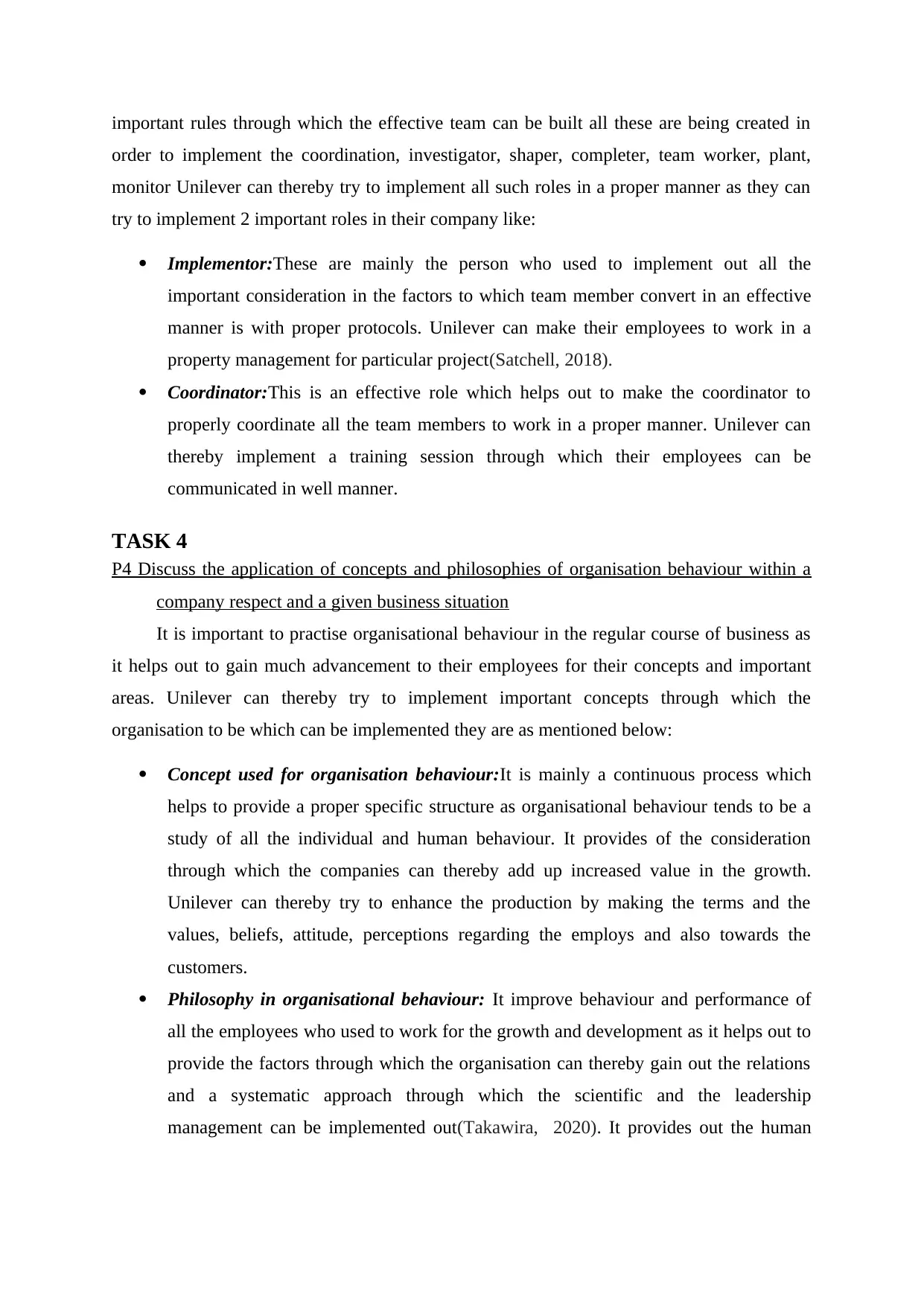
important rules through which the effective team can be built all these are being created in
order to implement the coordination, investigator, shaper, completer, team worker, plant,
monitor Unilever can thereby try to implement all such roles in a proper manner as they can
try to implement 2 important roles in their company like:
Implementor:These are mainly the person who used to implement out all the
important consideration in the factors to which team member convert in an effective
manner is with proper protocols. Unilever can make their employees to work in a
property management for particular project(Satchell, 2018).
Coordinator:This is an effective role which helps out to make the coordinator to
properly coordinate all the team members to work in a proper manner. Unilever can
thereby implement a training session through which their employees can be
communicated in well manner.
TASK 4
P4 Discuss the application of concepts and philosophies of organisation behaviour within a
company respect and a given business situation
It is important to practise organisational behaviour in the regular course of business as
it helps out to gain much advancement to their employees for their concepts and important
areas. Unilever can thereby try to implement important concepts through which the
organisation to be which can be implemented they are as mentioned below:
Concept used for organisation behaviour:It is mainly a continuous process which
helps to provide a proper specific structure as organisational behaviour tends to be a
study of all the individual and human behaviour. It provides of the consideration
through which the companies can thereby add up increased value in the growth.
Unilever can thereby try to enhance the production by making the terms and the
values, beliefs, attitude, perceptions regarding the employs and also towards the
customers.
Philosophy in organisational behaviour: It improve behaviour and performance of
all the employees who used to work for the growth and development as it helps out to
provide the factors through which the organisation can thereby gain out the relations
and a systematic approach through which the scientific and the leadership
management can be implemented out(Takawira, 2020). It provides out the human
order to implement the coordination, investigator, shaper, completer, team worker, plant,
monitor Unilever can thereby try to implement all such roles in a proper manner as they can
try to implement 2 important roles in their company like:
Implementor:These are mainly the person who used to implement out all the
important consideration in the factors to which team member convert in an effective
manner is with proper protocols. Unilever can make their employees to work in a
property management for particular project(Satchell, 2018).
Coordinator:This is an effective role which helps out to make the coordinator to
properly coordinate all the team members to work in a proper manner. Unilever can
thereby implement a training session through which their employees can be
communicated in well manner.
TASK 4
P4 Discuss the application of concepts and philosophies of organisation behaviour within a
company respect and a given business situation
It is important to practise organisational behaviour in the regular course of business as
it helps out to gain much advancement to their employees for their concepts and important
areas. Unilever can thereby try to implement important concepts through which the
organisation to be which can be implemented they are as mentioned below:
Concept used for organisation behaviour:It is mainly a continuous process which
helps to provide a proper specific structure as organisational behaviour tends to be a
study of all the individual and human behaviour. It provides of the consideration
through which the companies can thereby add up increased value in the growth.
Unilever can thereby try to enhance the production by making the terms and the
values, beliefs, attitude, perceptions regarding the employs and also towards the
customers.
Philosophy in organisational behaviour: It improve behaviour and performance of
all the employees who used to work for the growth and development as it helps out to
provide the factors through which the organisation can thereby gain out the relations
and a systematic approach through which the scientific and the leadership
management can be implemented out(Takawira, 2020). It provides out the human
⊘ This is a preview!⊘
Do you want full access?
Subscribe today to unlock all pages.

Trusted by 1+ million students worldwide
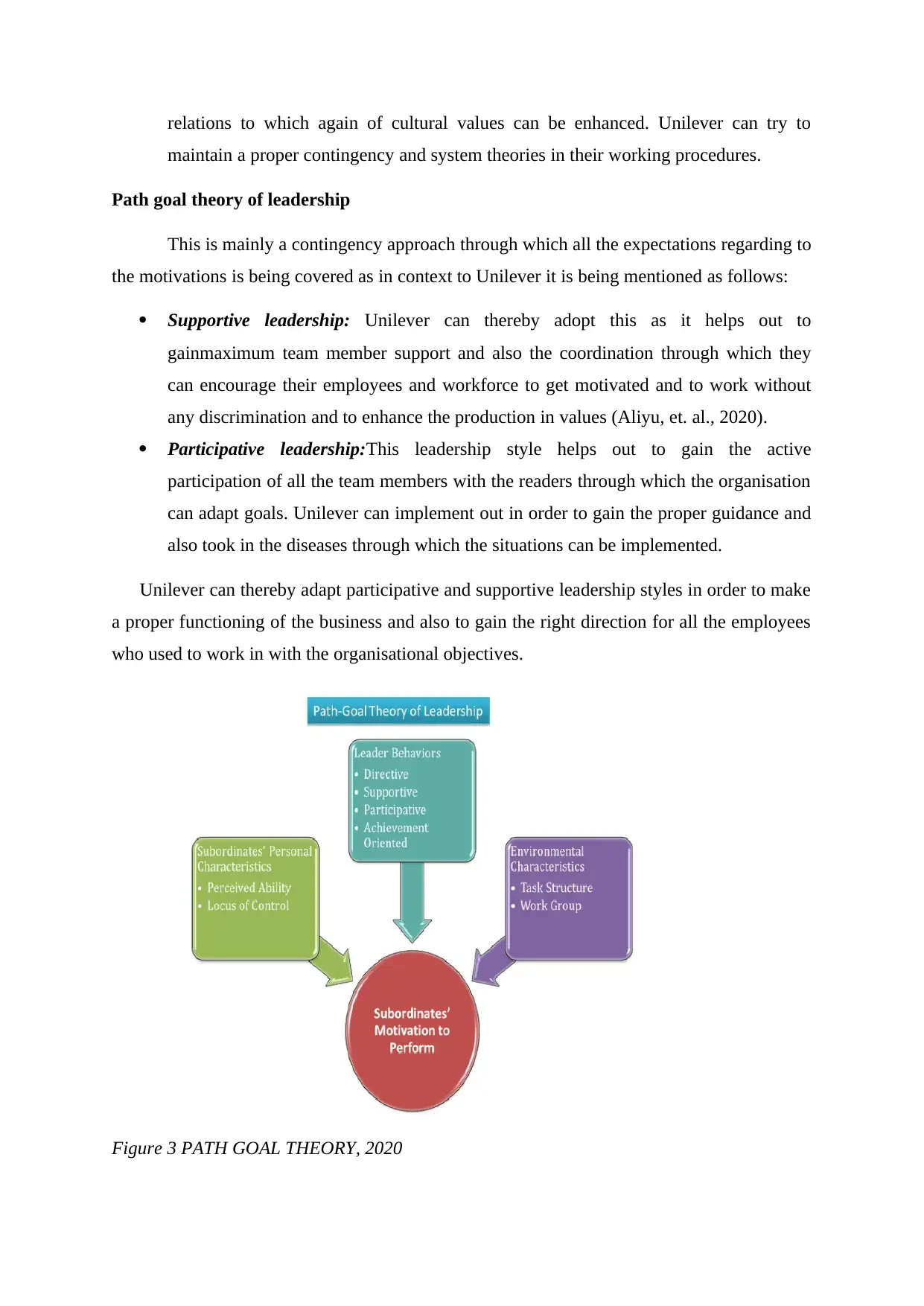
relations to which again of cultural values can be enhanced. Unilever can try to
maintain a proper contingency and system theories in their working procedures.
Path goal theory of leadership
This is mainly a contingency approach through which all the expectations regarding to
the motivations is being covered as in context to Unilever it is being mentioned as follows:
Supportive leadership: Unilever can thereby adopt this as it helps out to
gainmaximum team member support and also the coordination through which they
can encourage their employees and workforce to get motivated and to work without
any discrimination and to enhance the production in values (Aliyu, et. al., 2020).
Participative leadership:This leadership style helps out to gain the active
participation of all the team members with the readers through which the organisation
can adapt goals. Unilever can implement out in order to gain the proper guidance and
also took in the diseases through which the situations can be implemented.
Unilever can thereby adapt participative and supportive leadership styles in order to make
a proper functioning of the business and also to gain the right direction for all the employees
who used to work in with the organisational objectives.
Figure 3 PATH GOAL THEORY, 2020
maintain a proper contingency and system theories in their working procedures.
Path goal theory of leadership
This is mainly a contingency approach through which all the expectations regarding to
the motivations is being covered as in context to Unilever it is being mentioned as follows:
Supportive leadership: Unilever can thereby adopt this as it helps out to
gainmaximum team member support and also the coordination through which they
can encourage their employees and workforce to get motivated and to work without
any discrimination and to enhance the production in values (Aliyu, et. al., 2020).
Participative leadership:This leadership style helps out to gain the active
participation of all the team members with the readers through which the organisation
can adapt goals. Unilever can implement out in order to gain the proper guidance and
also took in the diseases through which the situations can be implemented.
Unilever can thereby adapt participative and supportive leadership styles in order to make
a proper functioning of the business and also to gain the right direction for all the employees
who used to work in with the organisational objectives.
Figure 3 PATH GOAL THEORY, 2020
Paraphrase This Document
Need a fresh take? Get an instant paraphrase of this document with our AI Paraphraser
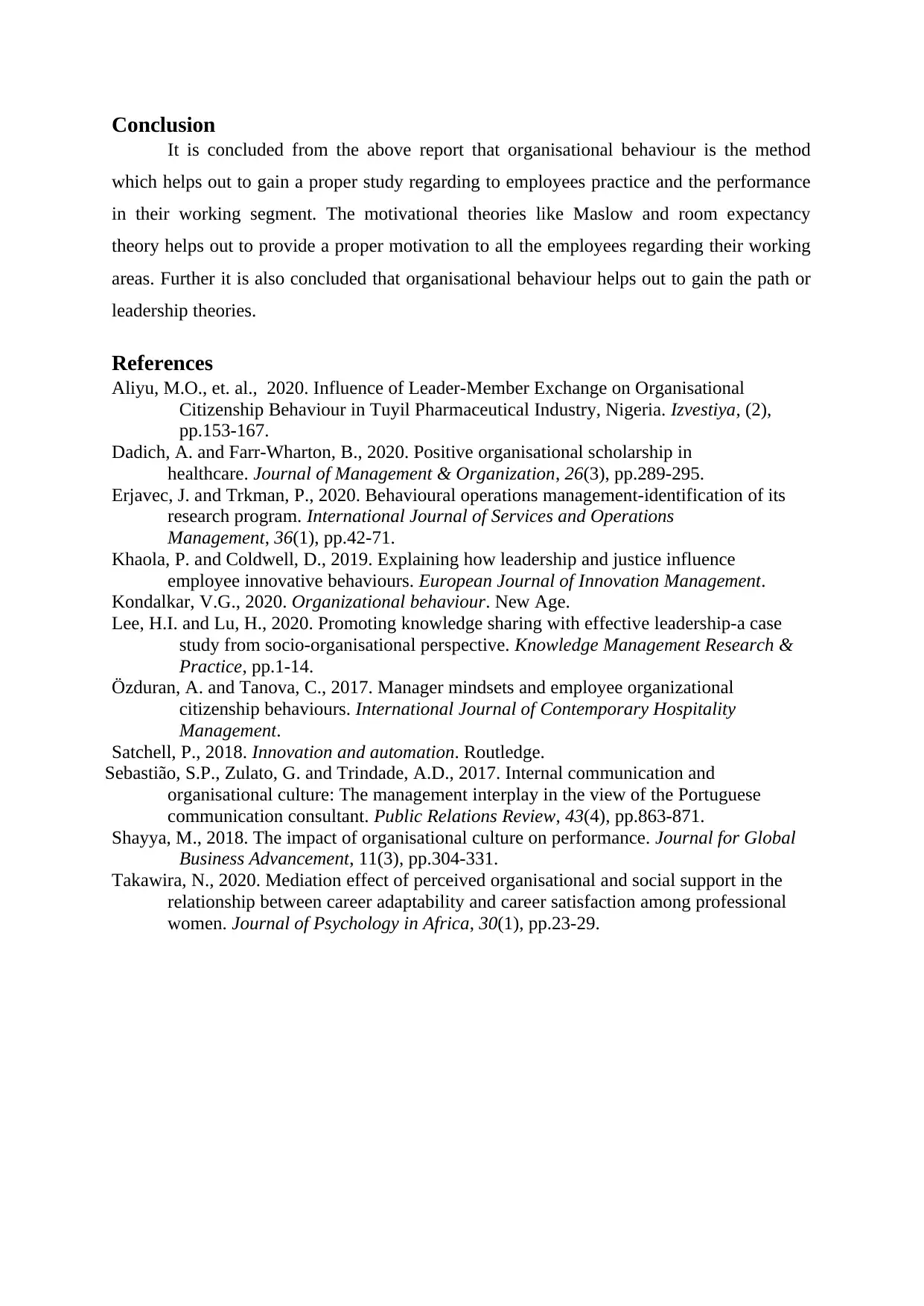
Conclusion
It is concluded from the above report that organisational behaviour is the method
which helps out to gain a proper study regarding to employees practice and the performance
in their working segment. The motivational theories like Maslow and room expectancy
theory helps out to provide a proper motivation to all the employees regarding their working
areas. Further it is also concluded that organisational behaviour helps out to gain the path or
leadership theories.
References
Aliyu, M.O., et. al., 2020. Influence of Leader-Member Exchange on Organisational
Citizenship Behaviour in Tuyil Pharmaceutical Industry, Nigeria. Izvestiya, (2),
pp.153-167.
Dadich, A. and Farr-Wharton, B., 2020. Positive organisational scholarship in
healthcare. Journal of Management & Organization, 26(3), pp.289-295.
Erjavec, J. and Trkman, P., 2020. Behavioural operations management-identification of its
research program. International Journal of Services and Operations
Management, 36(1), pp.42-71.
Khaola, P. and Coldwell, D., 2019. Explaining how leadership and justice influence
employee innovative behaviours. European Journal of Innovation Management.
Kondalkar, V.G., 2020. Organizational behaviour. New Age.
Lee, H.I. and Lu, H., 2020. Promoting knowledge sharing with effective leadership-a case
study from socio-organisational perspective. Knowledge Management Research &
Practice, pp.1-14.
Özduran, A. and Tanova, C., 2017. Manager mindsets and employee organizational
citizenship behaviours. International Journal of Contemporary Hospitality
Management.
Satchell, P., 2018. Innovation and automation. Routledge.
Sebastião, S.P., Zulato, G. and Trindade, A.D., 2017. Internal communication and
organisational culture: The management interplay in the view of the Portuguese
communication consultant. Public Relations Review, 43(4), pp.863-871.
Shayya, M., 2018. The impact of organisational culture on performance. Journal for Global
Business Advancement, 11(3), pp.304-331.
Takawira, N., 2020. Mediation effect of perceived organisational and social support in the
relationship between career adaptability and career satisfaction among professional
women. Journal of Psychology in Africa, 30(1), pp.23-29.
It is concluded from the above report that organisational behaviour is the method
which helps out to gain a proper study regarding to employees practice and the performance
in their working segment. The motivational theories like Maslow and room expectancy
theory helps out to provide a proper motivation to all the employees regarding their working
areas. Further it is also concluded that organisational behaviour helps out to gain the path or
leadership theories.
References
Aliyu, M.O., et. al., 2020. Influence of Leader-Member Exchange on Organisational
Citizenship Behaviour in Tuyil Pharmaceutical Industry, Nigeria. Izvestiya, (2),
pp.153-167.
Dadich, A. and Farr-Wharton, B., 2020. Positive organisational scholarship in
healthcare. Journal of Management & Organization, 26(3), pp.289-295.
Erjavec, J. and Trkman, P., 2020. Behavioural operations management-identification of its
research program. International Journal of Services and Operations
Management, 36(1), pp.42-71.
Khaola, P. and Coldwell, D., 2019. Explaining how leadership and justice influence
employee innovative behaviours. European Journal of Innovation Management.
Kondalkar, V.G., 2020. Organizational behaviour. New Age.
Lee, H.I. and Lu, H., 2020. Promoting knowledge sharing with effective leadership-a case
study from socio-organisational perspective. Knowledge Management Research &
Practice, pp.1-14.
Özduran, A. and Tanova, C., 2017. Manager mindsets and employee organizational
citizenship behaviours. International Journal of Contemporary Hospitality
Management.
Satchell, P., 2018. Innovation and automation. Routledge.
Sebastião, S.P., Zulato, G. and Trindade, A.D., 2017. Internal communication and
organisational culture: The management interplay in the view of the Portuguese
communication consultant. Public Relations Review, 43(4), pp.863-871.
Shayya, M., 2018. The impact of organisational culture on performance. Journal for Global
Business Advancement, 11(3), pp.304-331.
Takawira, N., 2020. Mediation effect of perceived organisational and social support in the
relationship between career adaptability and career satisfaction among professional
women. Journal of Psychology in Africa, 30(1), pp.23-29.
1 out of 11
Related Documents
Your All-in-One AI-Powered Toolkit for Academic Success.
+13062052269
info@desklib.com
Available 24*7 on WhatsApp / Email
![[object Object]](/_next/static/media/star-bottom.7253800d.svg)
Unlock your academic potential
Copyright © 2020–2025 A2Z Services. All Rights Reserved. Developed and managed by ZUCOL.



